TUM Think Tank
Where today's societal challenges meet tomorrow's technological excellence.
As partners of the "Festival der Zukunft" we will explore the topic: Future Island at the Munich-based Deutsche Museum. Meet us there:
GovTech in Action: Overcoming Digitalization Challenges in Germany
Germany's public sector faces significant challenges in its digital transformation. This panel discussion will explore how GovTech can provide solutions to these persistent issues. We will delve into the potential of AI to enhance public services and discuss the importance of government collaboration with start-ups. The panel will also address the major hurdles, including regulatory constraints, data privacy concerns, and the cultural shift needed within governmental organizations. Join us to uncover how innovative technologies can drive the digital future of Germany's public sector. Moderated by our Managing Director, Markus Siewert.
Panelists:
- Sandra Pavleka, acatech – Deutsche Akademie der Technikwissenschaften
- Vanessa Theel, Co-Founder & CRO at SUMM AI
- Lars Zimmermann, Co-Founder and Board Member of the GovTech Campus Deutschland
Thursday, 27 June 2024 - 3 - 4 PM
Dome Stage - Festival der Zukunft - Deutsches Museum
More Information here.
Discover our Labs & Projects at the Family Day - Free Entrance on Saturday, 29 June
At our walk-in booth, you will get an insight into the work of the TUM Think Tank. Here we dive into the future together, peer through the latest technologies into a world of tomorrow and yesterday, and discuss, experiment and explore together how we can shape and use technologies responsibly.
- The future up close (9 AM - 3 PM) : Imagine what the future could look like, discuss your ideas and paint a new world together with Generative Artificial Intelligence. Take home your own creation as a photo!
- Escape WhatsApp scammers together with your family (9 AM - 3 PM): Unmask scammers on WhatsApp and work together against the clock. A fun way to learn how to manage online risks.
- Jump into history via immersive reality (9 AM - 3 PM): Become an investigative journalist on the trail of deportations in Nazi Germany.
- AI in education (only at 10 AM, 12 PM and 2 PM) : How can artificial intelligence revolutionise learning? At our workstation you can try out AI tools, discuss ethical issues and explore exciting scenarios.
Join us at the first floor of the main building! Bring your family and friends and enjoy a glimpse into the future with us!
Quantum technologies can potentially reshape our society, for better or worse. For instance, quantum simulations could play a pivotal role in combating climate change, yet they could also be exploited to develop chemical weapons. How can we ensure that our society benefits from quantum technologies while mitigating potential risks?
In a commenary titled "A call for responsible quantum technology," published today in Nature Physics, Urs Gasser of the Quantum Social Lab at the TUM Think Tank, along with co-authors Eline De Jong and Mauritz Kop, advocate for the responsible handling of quantum technologies and the establishment of guidelines. Based on an international interdisciplinary effort led by the Stanford Center for Responsible Quantum Technology, the authors introduce a framework for responsible quantum technologies that integrates ethical, legal, socio-ecological, and policy implications into the research and development of quantum technologies.
Developing suitable guardrails and governance frameworks for quantum technologies are among the main objectives of the Quantum Social Lab, co-directed by Urs Gasser and Fabienne Marco. Towards this end, the lab brings together an interdisciplinary community to examine, evaluate, and help shape the development and use of quantum-based applications, and promote responsible innovation.
"History teaches us that ethical, legal, socio-economic, and policy implications are often only an afterthought when a powerful technology has already made its way from the lab into the wild,” says lead author Urs Gasser. “Given the possible ramifications of quantum technology, we should not repeat this mistake and create guardrails while it is still malleable. Our call in Nature Physics invites the science community to help shape defining principles and practices.”
The full commentary on responsible quantum technology can be found in Nature Physics:
The Urban Digitainability Lab aims to integrate digitalization and sustainability in urban spaces in order to shape sustainable urban services of general interest. It addresses the challenge that, despite the existing calls for such integration, a common understanding and effective concepts for combining sustainability and digitalization only exist in rudimentary form. The project plans to address this shortcoming by creating a community of practice, training opportunities and a catalog of criteria for measuring success. In addition, the exchange between science and practice is to be strengthened in order to develop innovative and sustainable solutions in the areas of "mobility", "housing" and "health".
We are excited to be building the team and are looking for three positions.
- Community Expert
- Transformation Coach
- Research Assistant
Find the role descriptions and more information on the application process (in German) through the button below.
Apply by April 2 and become part of the vibrant TUM Think Tank community. We are looking forward to meeting you!
The Stiftung Mercator supports this project at the TUM Think Tank in their section „Digitalisierte Gesellschaft“ for the duration of three years.
On February 16, the TUM Think Tank hosted a fireside chat featuring Sir Nick Clegg, President of Global Affairs at Meta. In conversation with Urs Gasser, rector of the Munich School of Politics and Public Policy (HfP), Sir Nick Clegg shared his perspectives and insights on a diverse set of topics at the intersection of artificial intelligence (AI) and innovation, particularly from a European standpoint.
The wide-ranging discussion touched upon the transformative potential of AI technologies, dissecting their implications across various sectors both within Europe and globally. Sir Nick Clegg, a leading figure in the technological landscape, shed light on Europe's unique contributions and regulatory considerations concerning AI and the metaverse.
Here are a few of the key points made during the fireside chat:
1. The countries that will most benefit from AI technology are those that can deploy it quickly and effectively, not necessarily the ones that develop it. Geopolitical discussions about AI are moving from attempts to control access to recognizing the inevitability of its widespread adoption. This shift is exemplified by companies like Meta open-sourcing their large language models (LLMs), indicating a trend towards sharing technology to maximize its use, rather than gatekeeping it.
2. Realizing the full potential of AI technology requires international cooperation, ideally among techno-democracies like the EU, USA, and India. Despite political challenges and varying approaches to technology policy, collaboration on research and policy could significantly advance AI's positive impact, particularly in fields like health and climate change.
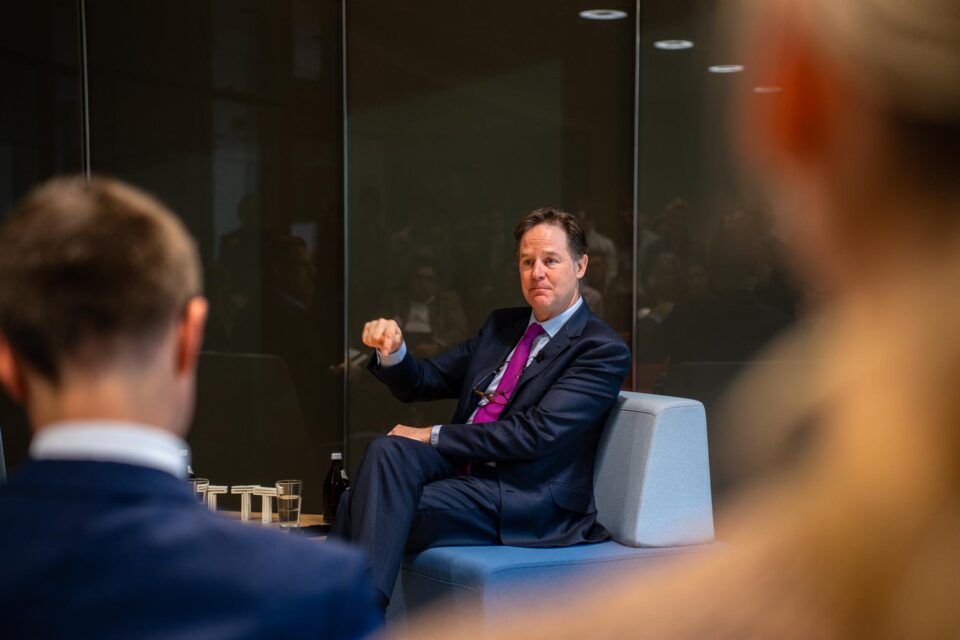
3. While AI's dual-use nature means it can be used for both beneficial and harmful purposes, particularly in generating realistic misinformation, ongoing efforts by tech companies to identify and label AI-generated content are crucial. Cooperation among major players to establish standards and responsibilities for AI-generated content can empower users to discern and mitigate misinformation.
4. The narrative that technology, including AI, is inherently detrimental to democracy is challenged by historical context and empirical research. Concerns about technology's impact are often exaggerated, and while it's essential to develop ethical guardrails alongside technological advancements, the relationship between technology and societal change is complex and not inherently negative.
5. In discussions about AI, we often sensationalize its dangers, treating scenarios like the Terminator as relevant and fearing AI's replacement of humans. This tendency stems from anthropomorphizing AI, attributing human-like qualities to it, resulting in misplaced concerns. Instead, AI should be viewed as a tool that excels in certain tasks, much like a fast-driving car. Moreover, there's a pattern where new technologies are exaggerated by both proponents and opponents, as seen historically with radio. Currently, AI's capabilities are overestimated, sparking moral panic and defensive regulations, detracting from the core question, which is how to effectively utilize it.
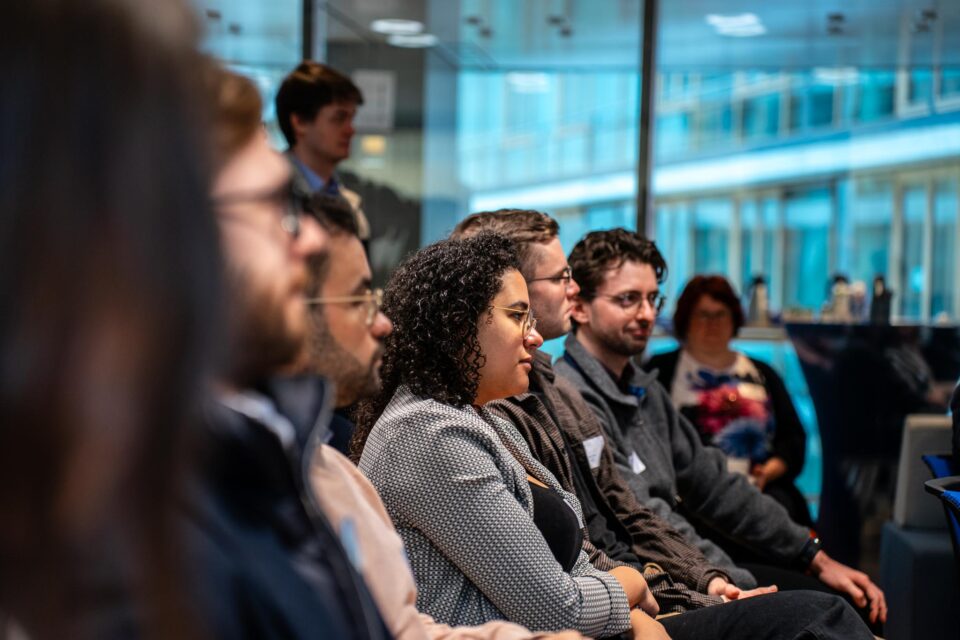 6. Companies like Meta, which are used by 4 billion people per day, bear significant responsibility, which they must acknowledge. We need guardrails that are not solely developed by tech companies, but are derived from the collaboration of government and society. It's not ideal that the development of guardrails occurs 20 years after the development of technology, like we see with Social Media. Ideally, this regulation process should happen concurrently.
6. Companies like Meta, which are used by 4 billion people per day, bear significant responsibility, which they must acknowledge. We need guardrails that are not solely developed by tech companies, but are derived from the collaboration of government and society. It's not ideal that the development of guardrails occurs 20 years after the development of technology, like we see with Social Media. Ideally, this regulation process should happen concurrently.
This is what our attendees had to say on the event:
Sofie Schönborn, PhD Student at HfP:
„I am delighted to witness the diverse array of individuals who have found their way here today. Here, students converge with industry leaders from the technology sector, alongside scholars from TUM and forward-thinking figures from the public sphere. The TUM Think Tank emerges as a vibrant hub, a melting pot of ideas, and a diverse cohort of individuals committed to technology, society, and democracy. This is the place to have the conscious discussions and joint deliberation about societal and political implications of technologies, about responsibility and potential futures ahead of us... and to collaborate to enable human-centric technology co-creation and co-design!”
PhD Student at HfP:
“As a researcher, engaging with leading practitioners in the field has been hugely rewarding. It provides me with direct access to valuable first-hand information and proved helpful to complement empirics for my research during follow-ups with them. Personally, their careers inspire me and I am already looking forward to our next guests at the TUM Think Tank.”

Franziska Golibrzuch, Master Student at HfP:
“It was extremely insightful to listen to such an expert – Sir Nick Clegg gave us the industry perspective whilst having an extensive background in government. Especially in the case of AI and within the current debate about AI regulation, security etc. this has been a great opportunity for us TUM students. All in all, it was a super interesting event which finds many applications to my studies because it puts the intersection of technology and politics in the center of the discussion and sheds, time and again, light on the critical and important overlaps in innovation, society and public policy realm. Even after the fireside chat I had the chance to pose questions, which I appreciate a lot.”
Thank you to the Meta team, for making this fireside chat possible and to everyone who took part and asked thought-provoking questions.
Sir Nick Clegg is President, Global Affairs at Meta. He joined the company, then called Facebook, in 2018 after almost two decades in British and European public life. Prior to being elected to the UK Parliament in 2005, he worked in the European Commission and served for five years as a member of the European Parliament. He became leader of the Liberal Democrat party in 2007 and served as Deputy Prime Minister in the UK's first coalition government since the war, from 2010 to 2015. He has written two best-selling books, Politics: Between the Extremes and How to Stop Brexit (And Make Britain Great Again).
Artificial intelligence and quantum technologies - disruptive technologies that can change the world. On February 6, Bavarian State Minister Markus Blume visited the TUM Think Tank. On the occasion of the launch of the QuantWorld project, funded by the Federal Ministry of Education and Research (BMBF) with 1.9 million euros, the TUM Think Tank presented two of its projects to the Bavarian State Minister of Science and the Arts: the Quantum Social Lab and the Generative AI Taskforce. An in-depth insight into the projects of the TUM Think Tank, which not only drives innovation, but also embodies an innovative entity itself.
The Generative AI Taskforce promotes responsible innovation
"ChatGPT was the 'iPhone moment' of generative AI," explained Noha Lea Halim, who presented the TUM Think Tank's Generative AI Taskforce. Generative Artificial Intelligence (AI) - most notably ChatGPT - has fundamentally changed our technological landscape. The rapid market entry of these new technologies has created a tension between innovation and regulation. To navigate these questions, the TUM Think Tank launched the Generative AI Taskforce in April last year. "The task force here at the TUM Think Tank ensures a transfer of knowledge from universities to industry and the state and strengthens Bavaria's pioneering role in the global AI landscape," says Halim.
Quantum technologies: The social transformation of tomorrow - already in view today
"In keeping with the theme of the iPhone moment of artificial intelligence, we are still waiting for the so-called QDay in the field of quantum technology," explained Urs Gasser, Rector of the Munich School of Public Policy (HfP). "Even though traditional computing systems are still widely used today, quantum technologies are already here and have the potential to change the future forever."
This is why Urs Gasser and Fabienne Marco founded the Quantum Social Lab in September 2022 with the support of TUM President Thomas Hofmann. The Quantum Social Lab deals with the ethical, legal, social and technical challenges and opportunities that await us in the course of the further development of this technology. As part of this, the Lab will bring these new technologies closer to citizens with the help of artists and a participatory learning platform through the QuantWorld project, which is funded by the Federal Ministry of Education and Research (BMBF) to the tune of 1.9 million euros. In view of the expected disruptive effects of second-generation quantum technologies, the project is investigating specific future scenarios in the fields of medicine, banking and mobility. "We don't know what the future will look like with second-generation quantum technologies, but we shouldn't miss the opportunity to shape it," Fabienne Marco, head of the lab, concludes.
"A think tank in the best sense of the word and a real flagship for AI research and AI application in Bavaria: the TUM Think Tank's projects fit in perfectly with Bavaria's AI measures. The AI age and the coming quantum revolution bring with them ethical, regulatory and social challenges that we want to address at an early stage. The Quantum Social Lab and the Generative AI Taskforce are preparing citizens and decision-makers in Bavaria for the opportunities and social impact of these disruptive technologies. We are delighted that these important programs are being implemented in Bavaria and are therefore happy to continue supporting the research and projects at the TUM Think Tank!" say the Bavarian State Minister for Science and the Arts, Markus Blume.
The Bavarian state government is actively committed to investing in key technologies, education, research, infrastructure, transfer and science as part of its high-tech agenda. The Minister's visit underlines the importance of innovation and collaboration between research institutions and public administration to push the frontiers of society and technological development. The Generative AI Taskforce and the Quantum Social Lab are just two examples of how social and technological transformation come together in the TUM Think Tank and at the HfP. We would like to thank the Minister of State for Science and the Arts, Markus Blume, for his visit and his great interest, and we look forward to further collaboration.
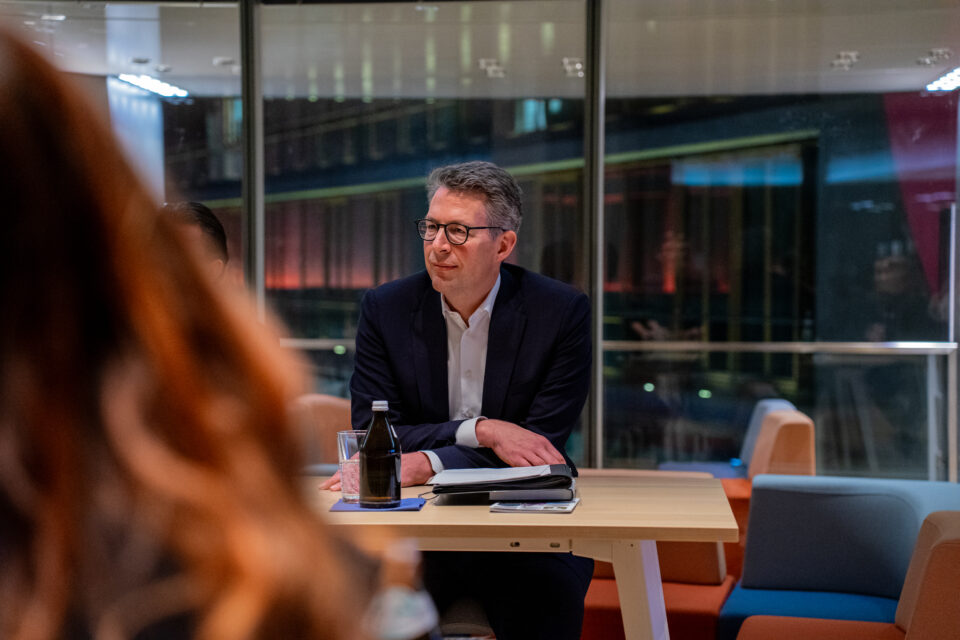
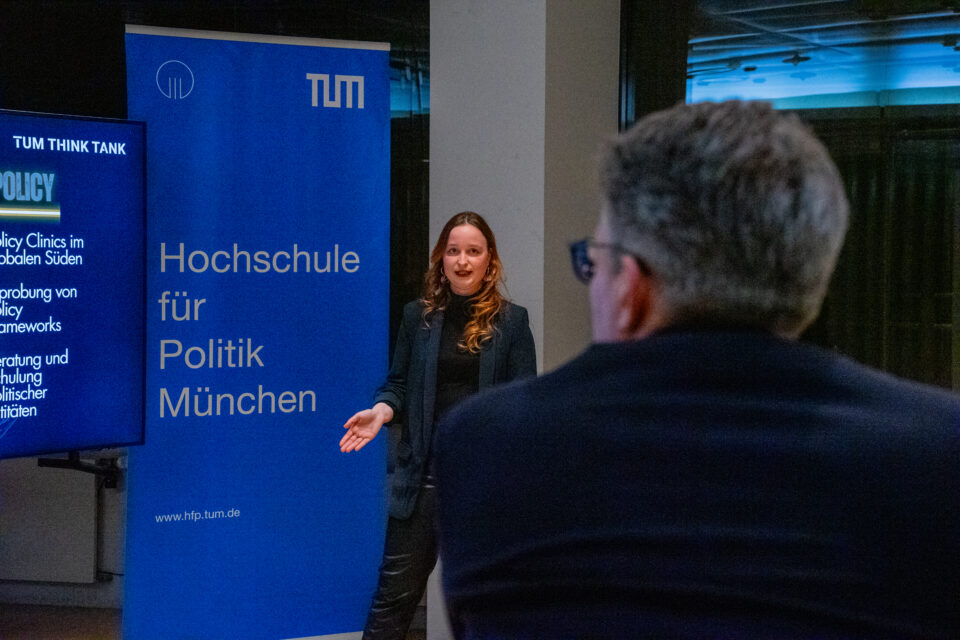
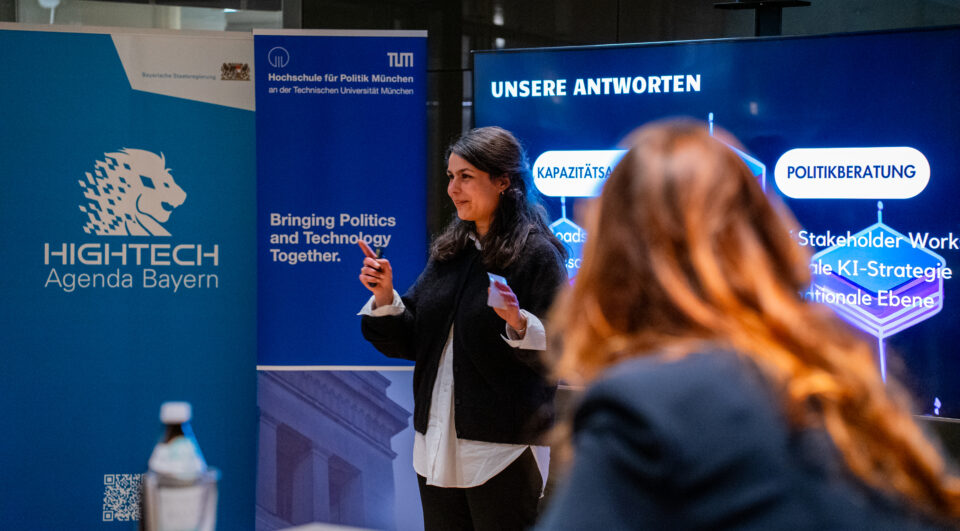
The research project "Using AI to Increase Resilience against Toxicity in Online Entertainment (ToxicAInment)", by Prof. Dr. Yannis Theocharis (Chair of Digital Governance), funded by the Bavarian Research Institute for Digital Transformation (BIDT), explores the spread of extremist, conspiratorial and misleading content on social media, investigating how this content is embedded through entertaining content. It aims to deepen the understanding of the impact of this content on user behavior by combining entertainment theories, visual communication and toxic language with AI methods. This project makes an important contribution to analyzing and combating online toxicity. More information can be found on the project page or in the BIDT press release.
After an intense three-day negotiation marathon, negotiators from the Council presidency and the European Parliament have successfully reached a provisional agreement on the proposal concerning standardized regulations for artificial intelligence (AI), known as the Artificial Intelligence Act. The objective of the draft regulation is to guarantee the safety of AI systems introduced to the European market and employed within the EU, with a commitment to upholding fundamental rights and EU values. This groundbreaking proposal additionally seeks to foster increased investment and innovation in the field of AI within Europe. Following this provisional agreement, efforts will persist at a technical level in the upcoming weeks to conclude the specifics of the new regulation. Once this work is completed, the presidency will present the compromise text to the representatives of the member states for endorsement. The comprehensive text will require confirmation from both institutions and undergo legal-linguistic revision before formal adoption by the co-legislators.
We asked members of our community for their insights on the AI Act. This is what they think:
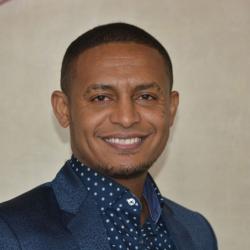 Samson Esaias: Associate Professor of Law at BI Norwegian Business School, Faculty Associate at the Berkman Klein Center of Internet and Society at Harvard University
Samson Esaias: Associate Professor of Law at BI Norwegian Business School, Faculty Associate at the Berkman Klein Center of Internet and Society at Harvard University
"Since the Commission's April 2021 proposal, consensus has emerged within the bloc's legislative bodies on a risk-based approach to AI regulation, along with innovation-supporting measures like sandboxes. Debates have focused on sensitive issues such as biometric identification for law enforcement and regulation of General Purpose AI (GPAI). The Parliament advocated for stronger fundamental rights safeguards, while the Council favoured broader exemptions for the use of biometric identification for law enforcement. The Parliament's GPAI regulatory proposal also encountered resistance from the Council, partly because it focuses on the technology itself instead of the associated risks. Nonetheless, from the press-releases, the Parliament seems to have secured significant wins, including bans on biometric identification using sensitive data, internet photo scraping for facial recognition, restrictions on predictive policing, and mandatory rights impact assessments for high-risk systems. Similarly, despite strong resistance from some member states, the latest draft also includes important obligations on GPAI and systemic foundational models, though criteria for the latter may be overly stringent. This focus on GPAI regulation, initially absent from the Commission's draft, highlights the shift in priorities over the past two years. The question that remains is whether these additions will stay relevant in two years when the legislation comes into effect or if they will highlight the need for a rethink on how to regulate such rapidly evolving technologies."
 Urs Gasser: Professor of Public Policy, Governance and Innovative Technology and serves as Rector of the Hochschule für Politik (HfP) and Dean of the TUM School of Social Sciences and Technology, Leader of the TUM Generative AI Taskforce
Urs Gasser: Professor of Public Policy, Governance and Innovative Technology and serves as Rector of the Hochschule für Politik (HfP) and Dean of the TUM School of Social Sciences and Technology, Leader of the TUM Generative AI Taskforce
"The agreement on the AI Act marks an important milestone. Above all, it is a powerful political signal to the global community, showing that the EU lawmaking bodies are functional and can come up with meaningful guardrails in a complex and fast-moving normative field, with human rights and democratic values as lodestars. Whether the AI Act as a complex legal and regulatory intervention – at times resembling a Rorschach test – will live up to the high hopes expressed by its leading proponents remains to be seen. AI governance as a normative field comes with many unknowns. Perhaps the biggest challenge ahead is to learn continuously and manage both legal path dependencies and unintended consequences that often come with such ambitious legislative projects, as the recent history of law, technology, and society teaches us."
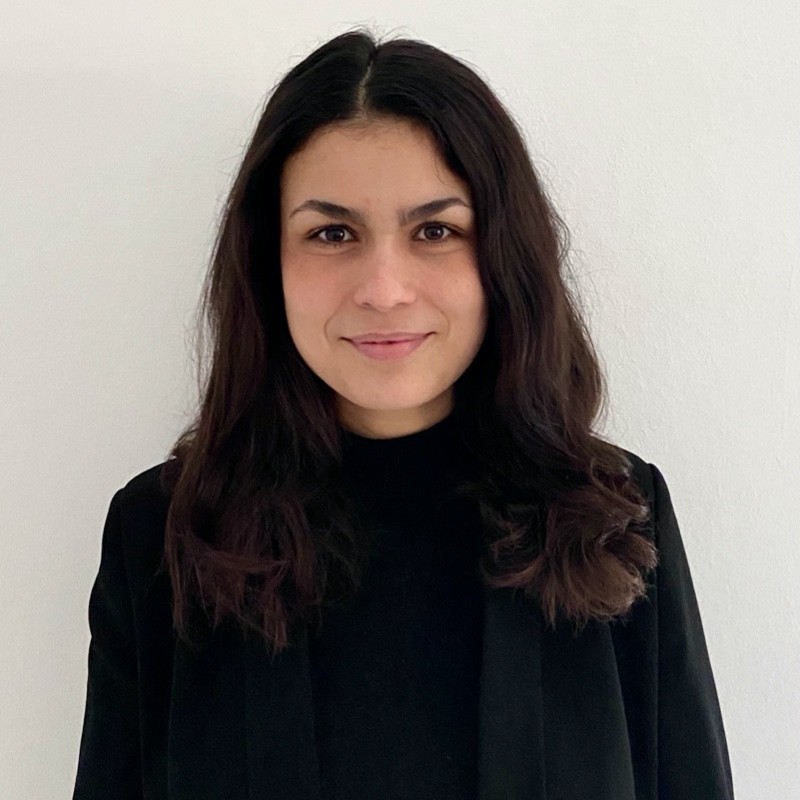
Noha Lea Halim: Doctoral Student and Research Assistant at the Professorship for Governance, Public Policy & Innovative Technologies at the TUM School of Governance, Assistant in the TUM Generative AI Taskforce
"The EU via its AI Act agreement brings forward a global benchmark regulatory proposal, representing most ambitious framework to date. By recognizing the need to not only regulate the economic but also the societal impacts of AI, it sets the tone for how AI might unravel in the future and implies far-reaching effects for the research and development of AI systems, in Europe and beyond.
The 12-24 months implementation phase will give a glimpse towards the long-term capability of the regulation to adapt to the technology’s disruptive potential as well as the Union’s ability for capacity building to bring the proposal to life.
The landmark proposal only marks the beginning of addressing AI’s future challenges, moving forward there will be many more to come."
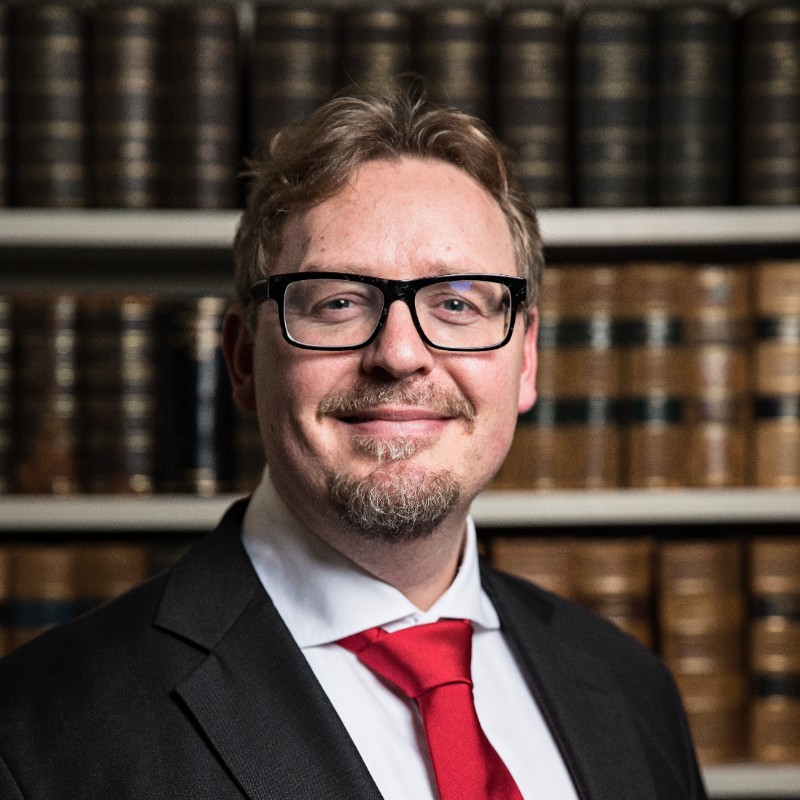 Timo Minssen: Law Professor, CeBIL Director, University of Copenhagen and Global Visiting Professor at TUM in Spring 2024
Timo Minssen: Law Professor, CeBIL Director, University of Copenhagen and Global Visiting Professor at TUM in Spring 2024
"While much controversy remains, reaching an agreement on the EU AI Act was crucial since the time to decide where to regulate (or not regulate) is now. AI is evolving so rapidly, and it's already used by millions of citizens in many areas and stages of life on a daily basis. Both the risks and the opportunities are real, and we must address them swiftly if we want to keep control and reap the benefits from this technology in sustainable, safe and fair ways.
Given the complexity of the topic and the need for trade-offs, the delays accompanying the negotiations of the AIA were not surprising. Many of the AIA’s more restrictive provisions, appear to have been slowly watered down. Mostly due to industry interests and competitive concerns, regulatory thresholds have been slowly lowered and more traditional value-based boundaries have been stretched out. For better or worse, we can also see similar developments in the drafting of such guidelines the Chinese interim regulations on generative AI, as well as in Western countries such as in the US and UK.
It is clear that these changing policy perspectives illustrate how AI challenges our traditional values and concepts which signifies the enormous stakes of the task at hand. The impact not only on businesses, welfare, industry, innovation, and the knowledge commons, but also on individuals’ access to - and protection from - powerful technology are massive. Calls for banning or more regulation of specific applications in the EU due to ethical and value-based legal concerns and precautionary approaches, had - and will have - to be balanced against both competitive disadvantages and health risks due to missed opportunities by setting overly high regulatory thresholds. It can therefore be assumed that the significance of so-called regulatory sandboxes will grow, although this is a concept in need of further clarification.
It also seems to me that while rigorously protecting human rights and fundamental values, the AIA has with its risk category-based based aporoach generally taken an regulatory ”as open as possible, and as closed (i.e. regulated) as necessary” position. In particular with regard to lower risk AI systems, this could be good news for many innovators and SMEs developers, though some might have preferred even less rules. On the other hand, those concerned about the risks, or established companies with powerful IP portfolios and regulatory departments, might have preferred an ”as closed as possible, and as open as necessary” approach with high regulatory thresholds, be it to prevent risks - or (!) newcomers and competition.
In that regard it is also important to bear in mind that, essentially, the current debates that we see mostly concern high-level rules. What matters in daily life is how these are implemented where the action happens, as well as if the rules that we set are enforceable, feasible and if compliance can be monitored. If the choice is between having a jungle of extremely detailed rules with insufficient means for enforcement, and having less but very robust and enforceable rule, I definitely prefer the 2nd choice to increase the respect for the rules."
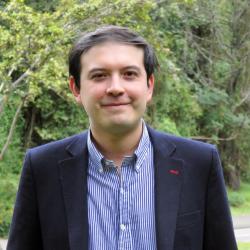
Armando Guio Espanol: Affiliate at the Berkman Klein Center for Internet & Society at Harvard University
"The EU AI Act is a regulation that not only will have an impact in Europe, but around the world. The adoption of this regulation will lead many countries to decide on their own rules regarding the development and implementation of this technology. It will be essential to follow the work that will come in the next months and the implementation process that will emerge in the European Union. In 2024 we will observe several countries join Europe in the official adoption of new regulations for AI systems. For example, several Latin-American countries are discussing now regulatory proposals for AI. The EU AI Act will have a considerable effect in mobilizing and accelerating many of these discussions. It will be also interesting to see how this policy fragmentation will impact the way this technology is being used and deployed, and the response of some of the biggest companies to this process."
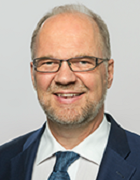 Dirk Heckmann: Law Professor at the TUM School of Social Sciences and Technology, Direktor bidt.digital, Generative AI Taskforce
Dirk Heckmann: Law Professor at the TUM School of Social Sciences and Technology, Direktor bidt.digital, Generative AI Taskforce
Whether the AI Act will prove to be effective regulation for AI will only be shown in legal practice. Political satisfaction does not replace legal certainty.
When: January 18, 2024
Where: Downtown Munich, Bayerischer Rundfunk (BR)
Hosted by: Bayerischer Rundfunk & TUM
Intended Audience: Researchers (professors, postdocs, PhD candidates) with an interest in AI and/or journalism and AI.
Join us in exploring the intersection of technology and journalism. This workshop focuses on getting to know the projects and methods being used in this exciting interdisciplinary field. And, to discover possible collaborations on use cases and methods. We look forward to connecting researchers in foundations, applications, and data! We explicitly encourage junior researchers to apply.
We want to hear from you if you work falls within one of the following topics:
- Language models for text services in journalism
- Dialect language model training
- Data to Text, Data to Graphics projects
- Automated audio fragmentation and tagging
- Face recognition in video content for metadata extraction
- Image or pattern recognition for investigations, e.g., in satellite imagery
Deadline for registration is December 5, 2023: https://collab.dvb.bayern/x/V5IuDQ
Participants will be selected within two weeks after submission deadline.
If you have any questions, please contact Emmelie Korell at emmelie.korell@tum.de
We look forward to seeing you in January!
The rapid development of quantum technologies (QT) promises an economic innovation boost, new breakthroughs in science, and unprecedented solutions to global societal problems. For years, TUM and the Munich region have been a hub for innovation and research in the field of quantum technologies. This research is now complemented by a flagship project from the newly established Quantum Social Lab at the TUM Think Tank. Supported by the BMBF with a total of 1.9 million euros, the project "QuantWorld" focuses on the future of responsible technology development, making quantum technologies understandable to people where they will impact their daily work. The project integrates social aspects into the world of quantum technologies and takes new methodological approaches by involving artists in knowledge dissemination, making quantum technologies experiential.
Quantum Technologies: The Path to the Future
Quantum technologies have the potential to reshape the world as we know it. Applications range from personalized drug development to contributions, climate protection through innovative battery technologies, to agricultural optimization based on more accurate predictions of natural events. While some applications such as quantum sensors in medical imaging are already on the market, others - like powerful quantum computers and developments in quantum communication - are still in their infancy.
To harness the full innovation potential of quantum technologies while also addressing their risks, including security threats or access equity, it is essential to engage with their societal dimensions and anticipate the potential impacts on people in their (professional) daily lives while technical development is still malleable.
This is where the "QuantWorld" project comes in. Funded by the Federal Ministry of Education and Research (BMBF),it enables citizens, regardless of their background, to gain insight into the world of quantum technologies today and prepare for the future. The project is part of the Quantum Social Lab at the TUM Think Tank and was developed in collaboration with Fraunhofer AISEC and the TUM Clinic Rechts der Isar entstanden.
Urs Gasser, Principal Investigator of the project and Dean of the TUM School of Social Sciences and Technology, sums up this challenge:"Quantum technologies can help us build a better future in many ways. However, we must ensure that societal, political, and ethical implications are considered from the outset, and technical innovations align with the well-being of people. We must avoid the mistake of only thinking about these aspects, as we did with AI, when applications emerge from the labs. QuantWorld is an attempt to be more proactive and participatory."
A Unique Educational Platform
The QuantWorld project provides a unique educational platform to introduce people to the world of quantum technologies, regardless of their prior knowledge. It combines innovative teaching methods, including artistic interventions, to make quantum technologies tangible and create a basis for a broad dialogue on the societal challenges associated with the development and establishment of second-generation quantum technologies.
Fabienne Marco, a doctoral candidate in computer science and political science who leads the Quantum Social Lab, provides a glimpse into the future: "Quantum technologies are abstract and built on complex mathematical and physical principles. Representing this abstraction requires new methods. Artistic interventions enable us to provide a new and disruptive way of accessing these technologies, initiating a transfer from the academic world to society, politics, and business. This concept will be further developed in the coming years to build an interdisciplinary network that focuses on the innovative communication of cutting-edge technologies and their applications, as well as the associated societal challenges."
Upon project completion, all suitable modules will be integrated into a QuantumBasics course, offering an overview of the fundamental workings of second-generation quantum technologies and potential future scenarios in the fields of medicine, banking, and mobility. Additionally, the artistic interventions will be made digitally accessible. In the long term, the learning experience from the QuantWorld platform will be transformed into virtual course formats to create an "immersive twin" of QuantWorld.
The project aligns with TUM's vision, committed to human-centered engineering. Thomas Hoffmann, President of TUM, emphasizes the importance of this approach: "This societal reference to complex technologies is critical for our innovation location in Munich. The QuantWorld project marks a crucial step toward a future where innovation and technology development are responsible, socially accepted, and sustainable."
For more information about "QuantWorld," please visit here.
About the Quantum Social Lab and the TUM Think Tank
The Quantum Social Lab focuses on researching and shaping the societal opportunities and risks surrounding quantum technologies, addressing responsible innovation and regulation, among other topics. It also offers various forms of knowledge dissemination regarding the theoretical and technological foundations of quantum technologies and is part of the TUM Think Tank.
The TUM Think Tank promotes societal and political change by bridging theory and practice. It creates interdisciplinary learning and experimentation spaces where stakeholders from science, society, and politics collaborate on specific questions and problems related to responsible technologies.
We had the privilege of participating in the Citizens.Lab at the IAA with our project "Mobilität.Leben." Over the past year, the team has looked into the mobility data of over 3000 participants to measure the impact of the 9-Euro-Ticket and its successor, the Deutschlandticket. Here, we share our key takeaways one year into the study:
Driving Change with Tickets
The 9-Euro-Ticket and the Deutschlandticket have played a significant role, especially during the summer months, in encouraging people to ditch their cars and opt for more sustainable public transportation options at least for some of their journeys.
Transition Challenges
However, in between the 9-Euro-Ticket and Deutschlandticket, without attractive public transportation tickets, participants returned almost to their pre-9-Euro-Ticket travel behavior. While every small step towards sustainability is valuable, we do not expect that the Deutschlandticket alone can substantially reduce the carbon emissions from the transportation sector.
Looking Ahead
A realistic cost-benefit analysis of the public transport fare innovations can be made at the end of the year. What's undeniable is that both tickets have already led to a simplification of the fare system, encouraging public transport use and savings in travel cost. It is clear that cheaper public transportation is just one piece in the larger puzzle of the “Mobilitätswende” and so the discussion continues on what additional ways we need to encourage more sustainable modes of transport.
Sparking reflection
The study was well received by the participants, who willingly shared their mobility data from the outset and remained committed to us until the introduction of the Deutschlandticket. Their feedback has been invaluable, and we're thrilled to hear that our tracking app has encouraged reflection on personal mobility habits. The study can also be seen as a signal that citizens like to be included in research projects and are eager to be part of the collective search for possible solutions to the grand societal challenges of our time.
Our study is globally one of the largest studies of its kind. It has not only advanced our understanding of mobility but also captured the attention of the worldwide transportation research community, strengthened Munich’s positioning on the global research map, and set new standards. We are proud that it has sparked public attention in regional and national media and several academic papers, bachelor and master theses – and more research is coming with several doctoral candidates using the data for their studies.
